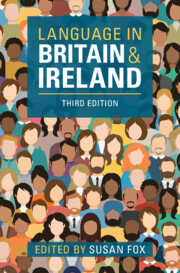Book contents
- Language in Britain and Ireland
- Language in Britain and Ireland
- Copyright page
- Contents
- Figures
- Tables
- Contributors
- Acknowledgements
- Map of Britain and Ireland
- Introduction
- Part I English
- Part II Multilingualism in Britain and Ireland: The Celtic Languages
- Part III Multilingualism in Britain and Ireland: Minority Languages
- 15 Channel Islands French
- 16 South Asian Languages
- 17 Chinese
- 18 Yiddish
- 19 European Immigrant Languages
- 20 Sign Languages in Britain and Ireland
- Part IV Multilingualism: The Development of Urban Contact Varieties
- Part V Applied Sociolinguistic Issues
- Index
- References
17 - Chinese
from Part III - Multilingualism in Britain and Ireland: Minority Languages
Published online by Cambridge University Press: 17 October 2024
- Language in Britain and Ireland
- Language in Britain and Ireland
- Copyright page
- Contents
- Figures
- Tables
- Contributors
- Acknowledgements
- Map of Britain and Ireland
- Introduction
- Part I English
- Part II Multilingualism in Britain and Ireland: The Celtic Languages
- Part III Multilingualism in Britain and Ireland: Minority Languages
- 15 Channel Islands French
- 16 South Asian Languages
- 17 Chinese
- 18 Yiddish
- 19 European Immigrant Languages
- 20 Sign Languages in Britain and Ireland
- Part IV Multilingualism: The Development of Urban Contact Varieties
- Part V Applied Sociolinguistic Issues
- Index
- References
Summary
The Chinese are one of the longest established and largest immigrant groups in Britain. There are a number of mutually unintelligible regional languages that are spoken amongst the Chinese. A complex pattern of multilingualism is emerging in the community. Intergenerational language maintenance and language shift are key sociolinguistic issues that the communites are collectively addressing. Contacts between the different languages have resulted in structural innovation and change that impact on all the languages concerned.
- Type
- Chapter
- Information
- Language in Britain and Ireland , pp. 402 - 412Publisher: Cambridge University PressPrint publication year: 2024

